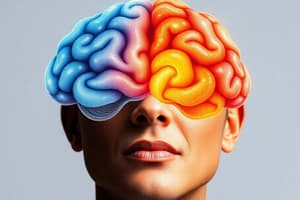Podcast
Questions and Answers
What is emotional intelligence?
What is emotional intelligence?
The ability to motivate oneself, persist in the face of frustrations, control impulses, regulate moods, empathize, and maintain hope.
Match the five domains of emotional intelligence with their descriptions:
Match the five domains of emotional intelligence with their descriptions:
Knowing one’s emotions = Self-awareness and self-reflection Managing emotions = Controlling how long emotions last Motivating oneself = Hope as a major indicator of emotional intelligence Recognizing emotions in others = The capacity for empathy Handling relationships = Managing interactions with others
Which of the following is NOT a domain of emotional intelligence?
Which of the following is NOT a domain of emotional intelligence?
- Motivating oneself
- Knowing one's emotions
- Managing emotions
- Financial intelligence (correct)
Empathy is important in maintaining relationships.
Empathy is important in maintaining relationships.
What talent is crucial for organizing groups?
What talent is crucial for organizing groups?
Which example fits with the skill of personal connection?
Which example fits with the skill of personal connection?
The capacity to recognize emotions in others is called ______.
The capacity to recognize emotions in others is called ______.
According to Howard Gardner, how many intelligences are important for understanding learning?
According to Howard Gardner, how many intelligences are important for understanding learning?
Flashcards are hidden until you start studying
Study Notes
Emotional Intelligence
- Emotional intelligence is the ability to motivate oneself and persist in the face of frustration.
- It involves controlling impulses, delaying gratification, regulating moods, keeping distress from hindering thinking, empathizing, and maintaining hope.
- Emotional intelligence includes five key domains: self-awareness, managing emotions, motivating oneself, recognizing emotions in others, and handling relationships.
Self-awareness
- Self-awareness involves knowing how one feels and understanding the thoughts behind those feelings.
- It allows for self-reflection.
- Recognizing an emotion signals the neocortex gaining control over the amygdala.
Managing Emotions
- Individuals can control the duration of an emotion, though not its occurrence or intensity.
- To manage anger, one can pause to assess the situation, challenge thoughts fueling the anger, and remove oneself from the situation or engage in physical activities.
- Active exercise is helpful in cooling down from strong emotions like anger.
Motivating Oneself
- Hope plays a crucial role in emotional intelligence, serving as an antidote to anxiety, defeatist attitudes, and depression.
- Optimism is a strong motivator, fostering expectations of positive outcomes in adversity.
Recognizing Emotions in Others
- Empathy is the ability to recognize and understand the emotions of others.
- Self-awareness forms the basis for empathy.
- Empathy is essential for maintaining relationships, as it reflects a caring capacity.
Handling Relationships
- Emotional intelligence is evident in how individuals manage their relationships with others.
Social Intelligence
- Social intelligence encompasses four key components: organizing groups, negotiating solutions, personal connection, and social analysis.
Organizing Groups
- This leadership skill involves mobilizing groups toward shared goals.
- Examples include orchestra conductors, military officers, and stage directors.
Negotiating Solutions
- This skill involves facilitating communication and finding solutions in conflicts.
- Mediators of disputes typically possess this talent.
Personal Connection
- This talent highlights empathy and connecting with the emotions of others.
- Teachers often exhibit this natural ability to relate to others.
Social Analysis
- This skill involves observing situations objectively and gaining insights into people's feelings and behaviors.
- Therapists frequently display this talent.
Multiple Intelligences
- Emotional intelligence is one of several key intelligences identified by Howard Gardner:
- Verbal-linguistic
- Mathematical-logical
- Spatial
- Kinesthetic
- Musical
- Interpersonal
- Intrapersonal
- Gardner's theory also includes two additional intelligences:
- Natural
- Spiritual
- These nine intelligences offer insights into learning modes, interests, and potential career paths.
Studying That Suits You
Use AI to generate personalized quizzes and flashcards to suit your learning preferences.




